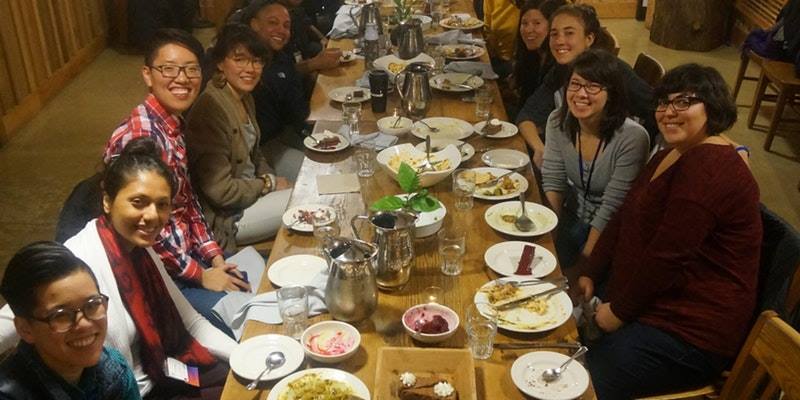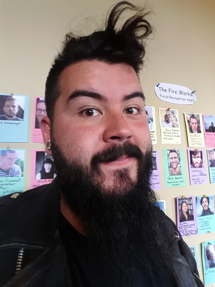
I’m not one to brag about myself. But that is exactly what I am going to do right now. I am going to brag about my class background. Because sometimes, it’s rough to be the only middle class person of color on a staff that is predominantly white and of upper class. It’s not a bad thing; it’s a challenge and a great opportunity for me to learn and gain more perspective and experience. And I wish to share all that I’ve learned with you.
From Rags to (Some) Riches
My class story is both unique and not unique, as most of them tend to be. My parents were both immigrants from Pakistan and came to America with close to nothing. They met here, fell in love and got married. Shortly after, my dad ventured into the franchise world, which can be very profitable but only after your original investment is matched. So basically, I was raised poor and we slowly ascended the class ladder until my parents were firmly rooted on the upper middle class rung of that ladder, sometime during my college years.
As you can imagine, this has been very confusing for me. What am I supposed to identify as? I can afford (some) designer clothes now, but there was a time I was bullied at school because my mom used to make my clothes since we couldn’t afford to buy nicer ones. My dad may be able to afford to drive a Mercedes now, but there was a time we used to shop at dollar stores. Add to this equation living and growing up in a white, Jewish, upper middle and owning class community in Long Island (my parents found a super cheap house there because it was in such horrible condition) and you can see the challenge.
When I first moved to my neighborhood in 3rd grade, the first thing I noticed immediately was the class difference between my classmates and me. Now, as a kid, I didn’t really grasp the concept of “class,” but I knew something was up. The kids around me went home in BMW’s; I went home in a Toyota. The second thing I noticed was how unbelievably spoiled some of the kids seemed. During lunch in middle school, I used to overhear stories of my classmates throwing temper tantrums to get the new computer they wanted; or in high school, getting a Hummer for their 16th birthday just because they turned a year older. It was quite baffling for me as everything I ever wanted, I had to earn. My parents saw education as the only thing really worth spending money on, and that’s exactly what they did.
Now this is not only a class thing, it is also a racial thing, which is a story for another time. It is impossible to separate race identity from class identity, as one is usually viewed through the lens of the other. The intersection of race and class can be cause for confusion and uniquely challenging. While acknowledging the complex relationship between the two, I want to clarify that in this piece, I am focusing more on my class identity.
During the writing of this post, I actually had a realization that my parents have moved past the upper middle class rung of the ladder. When I started college, I moved out of my house and (intentionally) dropped out of any future financial conversation with my parents. After some intense catching up, and while writing this post, I came to realize that my parents are actually considered wealthy. For my parents, wealthy means they can have a house here in the States as well as one in Pakistan, either fully own or partially own four franchises, can afford three cars and were able to pay for their daughter’s private education in full. Although my parents are wealthy, I am independent of them and still identify as middle class. At the same time, I am also aware that I am financially far better off than other poor, working or middle class folks simply from not having any student loans.
Lessons Learned
I never really understood how big a role both race and class played for me until I came to Resource Generation. Then I started noticing lots of things. Like how I am on top of biweekly timecard submission because if I’m not, it could mean I don’t make rent that month. Or how, when some of my friends outside of RG talk about family time, it is usually a happy moment, whereas having a simple conversation with my Pakistani parents turns into an attempt to bridge a cultural gap and seriously stresses me out. But you know what? I also learned how the other wealthier and mostly white people on staff want to help not just me, but all middle class people and all POCs*, really identify with and own their experiences.
When I first heard about RG, I thought it was a lie because people like this don’t actually exist. Society teaches me to hate and be angry at these same folks. The thought that people with privilege would want to even consider fighting classism was laughable to me. Everything just further perpetuates the stereotype that they have everything they could ever want while we (poor, working, middle class folks) struggle and suffer. And they don’t care about us- the audacity! Right?
And yet, RG continuously breaks down these stereotypes and beliefs and gives me reason to pause. You mean these people are not out to get me? They actually want to stand by my side and hold my hand as I break down? That’s crazy talk! But I feel like that all the time at RG. It’s really a fascinating feeling. And terrifying and challenging as hell at the same time, especially for me. As someone who prides herself on having built a ridiculously strong and hard exterior shell (and credits this as getting her thus far in life), it is sometimes too much to ask me to break down and talk about the pain I have burrowed deep inside. But I think this is what RG does best – pull folks out from their comfort zone and push them to look deep inside and confront all the emotional baggage head on. And I can confidently say that it actually works. I am unpacking and processing all kinds of feelings and thoughts that I had never previously given the light of day in my past 24 years. And you know what? I am growing so much and learning how to let some of that baggage go as a result.
The Dream
The world RG works towards is so beautiful, sometimes I just get caught up in the what ifs. What if everyone was held and carried through life with minimal worry? What if every person was entitled to discovering the beauty of life and not just the pain and hardship? What if immigrants like my mom didn’t feel like they had to give up their law degree just so they could take care of their kids?
And then I wake from the dream and really want to cry as the harsh reality of where we stand as a world lands on me. But at the same time, I am hyper aware of how rough the transition from the old world to the new one would be. It would essentially be asking everyone to give up the chip they carry on their shoulder. For poor, working, middle class folks, this chip is the one that might scream, “This sucks and the world owes me something” or “I can’t trust anyone around me; to make it, I need to do it on my own.” I know I have that chip permanently affixed to my shoulder, no matter how many times I try to shake it. For wealthy and upper class folks, this chip is the one that might cry, “Accumulating wealth will shield me from racism as a POC” or “I will forever carry so much shame and guilt from what my ancestors have done.” This is an echo that I have heard often from within the RG community and it is interesting to note that many fears revolve around trusting others. To really be able to move forward and progress as a society, we need to work on building trusting relationships with others, regardless of class or race differences. I personally can’t wait until we can all throw these cares into the wind, join hands and never look back.
Actions Taken
About three months ago, I went on a camping trip with one of my friends. While we were drinking hot chocolate by the stove in the camping ground, another camper and his son came to chat to our group. As we talked, he asked what we all did. When it came to my turn, I explained how I was the office administrator for an organization that targets young people who identify as wealthy and want to use their resources and privilege for social change.
I swear you could hear a pin drop in that space.
And in that split second, I braced myself for the response. “Well that’s great for them, it’s not like they’ve ever wanted anything they couldn’t get. Their lives must be soooo difficult.” Besides having a sudden urge to slap him, I had the realization that just a few months before, I would have had the same response. I was so ashamed of this fact. Because I was imagining the faces of all the amazing folks I have met through RG who really are working to equalize wealth. So I responded in the best way I know how to when someone irritates me – I shut him down. “You’d be surprised at how much emotional baggage and burden comes with most wealth. It’s the kind of shame, pressure and isolation that you and I could never imagine. So yeah, their lives are difficult in a very different way than ours are.” His face was priceless.
In retrospect, I could have initiated a conversation with him rather than snap the way I did. But I was so overcome with anger at him for attacking people I love so deeply and care so much about, that that was my gut reaction. Although I felt a bit of regret for not taking that route, I was also so damn proud of myself. I never thought that I would be taking the viewpoint I did and standing up for wealthy people, the same people I had grown up with and was taught to hate pretty much my entire life. But RG introduced me to the progressive group within the wealthy community. The one that valued me just for bringing my whole self to the table. The one that has repeatedly held me when the emotions and pain just become too much. And the one that wants to stand right by me as we move closer to the dream.
Area for Growth
Through all the complicated process of healing and learning, I’ve discovered many more questions than answers, and I am really psyched about this fact. I’ve already had one conversation with my mom about money and plan to have many more. I’ve also started asking my parents lots of questions about where they come from and their experiences. I’ve realized that in my culture, silence around family history and money especially seems to be the norm. Or this could also be the immigrant experience of trying to bury the pain and struggle and focus on the success. But either way, I am breaking the cycle I grew up in and intentionally probing for answers as RG has introduced me to the power behind knowing where you really come from.
And so I invite all folks, whether you’re white or a POC, whether you’re wealthy or poor, working or middle class to pause and really think about where you come from and what it took for you to be where you are today, not only financially but also as a full person. And if you don’t know the answers to these questions, as I initially did not, I challenge you to start pushing in all the right places to get this information.
Specifically to all the poor, working and middle class allies that are in this work with RG, I am putting out an ask to engage in more conversations around your class identity and be more vocal about the challenges and victories you’ve had. And not just with other poor, working and middle class folks, but also with wealthy folks. The dream is not possible without people from all class backgrounds, so don’t be shy to raise your voices and get your thoughts and ideas out there. This could mean doing something more public such as writing a blog post, or it could mean doing something more private such as talking to your wealthier friends about their experiences.
I plan on continuing my quest to really own my various identities and experiences. Regardless of how painful and difficult it can be.
In Conclusion
Social change is here knocking at your doors ladies and gentlemen, and it won’t stop until it has kicked that door down.
*Note: POC refers to person of color.





I appreciated the author’s honest sharing. But I did find myself questioning her description that she was “raised poor” as a child, and then her parents ‘worked their way up the class ladder by college.’ A lot of immigrants (like my family) may have had little money, but they brought a lot of social capital that they got from being of privileged classes in their home country. Yes, my parents came here with nothing as Vietnamese refugees in 1975, but they had the benefit of college educations, which are distinctly make them NOT lower-class, no matter how little their income was. Her mother may have not been chosen not to be a lawyer, but somehow she did get a law degree. Yes, they still face racism and discrimination in the workplace and elsewhere, but the structural obstacles of poverty are different. Yes, she may feel like she’s financially independent from her parents (after they paid for her private university education in full), but that doesn’t feel totally honest. She has a safety net that most other people can’t rely on, and that’s about privilege.
I bring this up not to nit-pick, but because I think when we invisibilize class and privilege from immigrants’ home countries, our stories sound like immigrant “pull yourself up by your bootstrap” stories that are used against poor people of color who haven’t been able to ”start with nothing” and then ‘ascend the class ladder.’
Thank you for sharing your thoughts, and this blog post made me think a bit more about how to accurately describe the complexity that makes up the immigrant/multi-class experience.